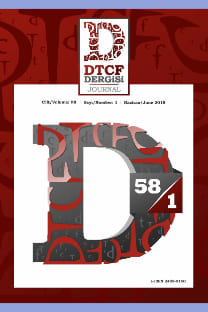YÛNUS EMRE DÜŞÜNCESİNDE MEDENİYET DEĞERLERİ
Medeniyet tarihine baktığımızda her medeniyetin bir veya birkaç şahsiyet ile özdeşleştirildiği görülür. Türk-İslam Medeniyetinin ilk akla gelen sembol şahsiyetlerinden biri hiç şüphesiz Yûnus Emre'dir. Yûnus Emre'nin gündelik bir dilden türettiği yüksek mana ve hikmet dili dünya var oldukça insanlığa yol göstermeye devam edecektir. O, sade ve gösterişten uzak bir dil ve üslup ile en yüksek hakikatleri ifade etmiştir. Bu yolla insana lâzım olan benlik bilincini inşa etmiştir. Sevgiye dayalı bir insan, toplum ve evren görüşü oluşturmuş ve temsil etmiştir. İnsanın ve varlığın özünün ilahî aşk ve rahmet olarak benimsenmesi yeni bir medeniyet tasavvuru sunmaktadır. Burada ilim, irfan ve aşk da bütünleşmektedir. Böylece Yûnus Emre öğretisinden bir tarz sevgi ve bilgelik medeniyeti tasavvuruna ulaşılmaktadır.
CIVILIZATION VALUES IN YÛNUS EMRE'S TOUGHT
When we look at the history of civilization, it is seen that every civilization is identied with one or more personalities. One of the rst symbolic gures of the Turkish-Islamic Civilization is undoubtedly Yûnus Emre. The language of high meaning and wisdom, which Yûnus Emre derived from a daily language, will continue to guide humanity as long as the world exists. He expressed the highest truths with a plain and unpretentious language and style. In this way, he built the self-consciousness that man needs. He created and represented a love-based view of man, society and the universe. Adopting the essence of man and existence as divine love and mercy presents a new conception of civilization. Here, science, wisdom and love are also integrated. Thus, a kind of conception of love and wisdom civilization is reached from the teaching of Yûnus Emre.
___
- Bakar, O. (2012). İslam Düşüncesinde İlimlerin Tasnifi. Ahmet Çapku (Çev.). İstanbul: İnsan.
- Bayraktar, L. (2019). Türk-İslam Düşüncesine Genel Bir Bakış: Felsefe Kelâm ve Tasavvuf. Millî Mecmua, (7), 65-70.
- Bayraktar, L. (2016). Felsefe ve Tasavvuf. Ankara: Aktif Düşünce.
- Sezgin, F. (2017). İslam Bilimler Tarihi Üzerine Konferanslar. İstanbul: Timaş.
- Takış, T. (2007). Davud, Golyat'a Karşı. Doğu Batı, 10 (41), 7- 8.
- Ülken, H. Z. (2007). Uyanış Devirlerinde Tercümenin Rolü. İstanbul: Ülken.
- Tatcı, M. (2005). Yûnus Emre Külliyatı II Yûnus Emre Divânı Tenkitli Metin. İstanbul: Milli Eğitim Bakanlığı.
- ISSN: 0378-2905
- Yayın Aralığı: Yılda 2 Sayı
- Başlangıç: 1942
- Yayıncı: Ankara Üniversitesi Dil ve Tarih-Coğrafya Fakültesi
